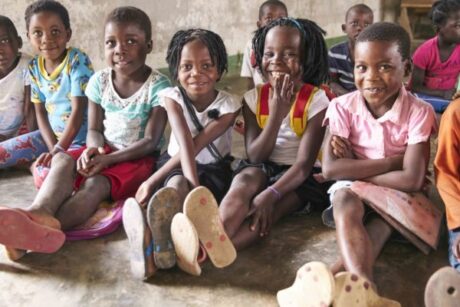Excitement and relief overcame Edna Jaime, a mother from the Matxayane community in Zambézia, Mozambique, when she learned the Vamos Ler!/Let’s Read! program would expand bilingual education to her daughter’s school in 2019.
School council and community members from Matxayane discussed the government’s approach to mother-tongue-based bilingual education and implications for their communities at a meeting led by the Let’s Read! program. Many were eager to learn more about teacher recruitment and school materials, but Jaime was curious if this meant her 7-year-old daughter Natércia would be able to return to school.
Natércia’s school had previously only taught in Portuguese, forcing her to drop out after the first semester because she wasn’t able to learn in a language she didn’t understand. Her struggle is common in Mozambique as many people are more proficient in local languages than the national language, Portuguese.
“I saw sadness and fear in my daughter’s eyes when she was telling me how uncomfortable she felt at school because she could not understand [her] teacher’s language last year. As a mother, it was even more painful to not know how to help her because I also couldn’t understand anything of school lessons [in Portuguese],” said Jaime. “But I knew my child was intelligent.”
The five-year Let’s Read! bilingual early grade literacy program is working in partnership with the Mozambique Ministry of Education and Human Development to improve early grade literacy instruction in Grades 1-3. The program promotes instruction in three local languages – Emakhuwa, Elomwe and Echuwabo – in Nampula and Zambézia provinces to prepare children for transition to Portuguese in later grades. The Let’s Read! program is funded by the U.S. Agency for International Development and implemented by Creative Associates International in close partnership with World Education, Inc., Overseas Strategic Consulting, American Institutes for Research and Bluetree Group.
In 2018 Let’s Read! reached over 110,000 Grade 1 students in 907 schools, in Nampula and Zambézia. The Bilingual Education Campaign in Nampula and Zambézia reached approximately 7,410 participants.
In 2019, the program will reach over 400,000 Grade 1 and 2 students, in nearly 2,000 schools.
Mother-tongue bilingual education creates confidence and motivation
During the community meeting, Jaime learned that Let’s Read! would provide teachers and students with local language and Portuguese books to use during the school day, as well as writing exercises and supplementary texts for the students to practice at home with their families. Jaime lacks strong literacy and numeracy skills and became worried about the level of support she could provide her daughter at home.
Susana Carlos, a technician at the Provincial Directorate of Education in Zambézia and the Bilingual Education Campaign facilitator, explained to her that being literate is not required for parents to support their child’s learning at home.
“Parents and guardians are expected to firstly give time to their children to explore their exercise books or readers, but when they go from page to page they could encourage their children’s interest to unpacking the story, talking through the illustrations, and imagine what might be on the next page. And by doing so, and showing an interest in their child’s school materials, the parents will have already played their important role, even though they happen to be illiterate,” said Carlos in the community meeting. The child who does homework with parents’ or guardians’ support is emotionally more prepared and more ready to learn and engage in the classroom than a child who does not get the attention from his parents or does not do his or her homework.”
Carlos also explained that when children learn in their own language they become more confident to ask questions and share what they learned in school – one of the many benefits of bilingual education.
The bilingual education community meetings offer a platform to encourage parents and guardians, like Jaime, to support their children’s education. The guidance from ministry officials like Carlos motivate parents to support their children’s attendance and participation at school.
With local language as a subject and language of instruction, parents and guardians like Jaime can engage in deeper conversation with their children, continue to support their child’s education and may also learn more about how to read and write in their own language.
Natércia used to cry when she did not understand the lessons in Portuguese and became uninterested in attending school.
Today she can learn in Elomwe and is excited to attend school daily.



